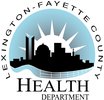The Lexington-Fayette County Health Department’s Board of Health selected Kentucky State Sen. Reginald Thomas as the 2017 Dr. Rice C. Leach Public Health Hero. The award is given annually to individuals who have demonstrated their dedication to improving the health of Lexington residents. The winner is announced each April as part of National Public Health Week (April 3-9, 2017).
Thomas, who represents part of Fayette County in the state senate, is a public health advocate through his actions statewide, including co-sponsoring legislation to teach high school students CPR, supporting rights of breastfeeding mothers and protecting children and adults against abuse, neglect and exploitation. He has supported bills offering better services for autistic individuals, gaining rights for child care centers to administer epinephrine injections for allergic reactions and removing barriers to colorectal screenings.
Thomas has also worked closely with the Lexington-Fayette County Health Department for information to help shape statutes and regulations to improve the health and well-being of Kentuckians.
He is an active community member in Lexington, serving or having served on the boards of the Lexington Actors Guild, the Lexington Convention and Visitors Bureau, the Kentucky Conference of Community and Justice, Bluegrass Community and Technical College and Commerce Lexington. He is a graduate of Bryan Station High School, Dartmouth College and Harvard Law School. He and his late wife Lynda have three children and one granddaughter.
Thomas “is a selfless advocate of protecting and prospering the health and well-being for all members of Lexington and Fayette County,” states the award nomination. “He is a true champion for public health.”
Thomas will be recognized at the April 27 Lexington-Fayette Urban County Council meeting. He will also be honored at the May 8 Board of Health meeting held at 5:45 p.m. at the Lexington-Fayette County Health Department, 650 Newtown Pike.
Previously known as the Public Health Hero Award, the Board of Health renamed the award in 2016 in memory of the late Dr. Rice C. Leach, Lexington’s former Commissioner of Health who spent more than 50 years as a public health physician. Leach died April 1, 2016.
Past winners include Dr. Susan Pollack and Marian F. Guinn (2015), the Rev. Willis Polk and baby Health Service (2014), Anita Courtney and Teens Against Tobacco Use (2013); Vickie Blevins and Jay McChord (2012); Jill Chenault-Wilson and Dr. Malkanthie McCormick (2011); Dr. Jay Perman (2010); the Lexington Lions Club (2009); Dr. David Stevens and the late Dr. Doane Fischer (2008); Dr. Ellen Hahn, Mary Alice Pratt and Therese Moseley (2007); Dr. Andrew Moore and Rosa Martin (2006); Jan Brucato and Dragana Zaimovic (2005); and Dr. John Michael Moore, Ellen Parks and Lexington-Fayette Urban County Government (2004). Dr. Robert Lam received a Lifetime Achievement Award in 2007.
For additional information, like the Lexington-Fayette County Health Department on Facebook at www.facebook.com/LFCHD, or follow us on Twitter at twitter.com/LFCHD and Instagram at @lexpublichealth.
Be sure to listen to our Healthy Times radio interview with Reggie Thomas to hear more from the 2017 Dr. Rice C. Leach Public Health Hero!
